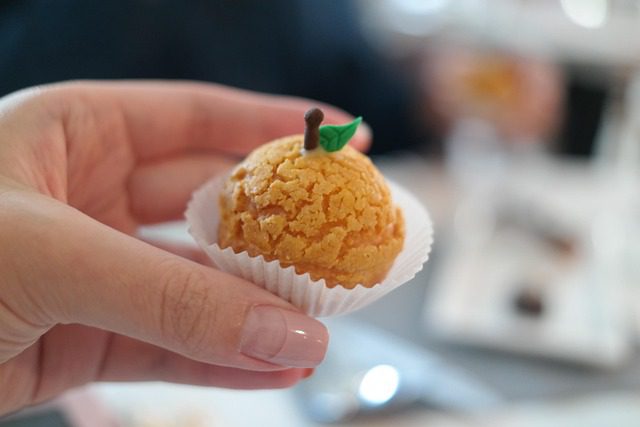Yuzu is internationally popular. Let’s explore the citrus jewel of Asia, yuzu fruit, with its health benefits, types, kitchen uses, and helpful tips.
Table of Content:
Yuzu
In the vibrant world of citrus fruits, one rare gem stands out with its aromatic zest and unique flavor profile: yuzu. Revered in East Asia for centuries, yuzu (Citrus junos) is a citrus fruit that originated in China and later found its spiritual and culinary home in Japan and Korea. Though it resembles a small, uneven lemon or a hybrid of lime and grapefruit, its complexity and depth of flavor place it in a category of its own.
In recent years, yuzu has gained international attention. As a result, making its way into gourmet kitchens, cocktail bars, skincare lines, and even wellness practices. But what makes this fragrant fruit so special? In this article, we’ll explore the different types of yuzu, its numerous health benefits, how it’s used in cooking, and practical tips for using it at home.
What is Yuzu?
Yuzu is a citrus fruit believed to be a hybrid between Citrus ichangensis and Citrus reticulata. It grows on small, thorny trees and is about the size of a tangerine, typically yellow when ripe. The skin is thick, bumpy, and highly aromatic — in fact, yuzu’s aroma is often considered more valuable than its juice.
Unlike most citrus fruits, yuzu is rarely eaten raw due to its tartness and high seed content. However, its juice, zest, and peel are prized in culinary and wellness contexts alike.
Types of Yuzu
Though yuzu is not as genetically diverse as other citrus families, there are a few notable variations. Let’s explore some of them below.
1. Standard Yuzu (Citrus junos)
This is the most commonly found variety. It is used in both culinary and cosmetic applications, known for its tart, floral juice and fragrant peel.
2. Hanayuzu
Translated as “flower yuzu,” this variety has a more delicate aroma and is used in high-end perfumery and cosmetics. It tends to be smaller and more floral in flavor.
3. Shishi Yuzu (Lion Yuzu)
A rare ornamental variety with deeply ridged skin, sometimes grown for decoration or to infuse baths with its scent.
4. Seedless Yuzu
Through cultivation and hybridization, some seedless varieties have been developed. These are particularly valued for culinary use, though they are harder to find.
Health Benefits of Yuzu Fruit
Yuzu is not only deliciously aromatic but also packed with nutrients and wellness-enhancing properties. The following are some of the key health benefits of yuzu.

1. Rich in Vitamin C
Yuzu contains high levels of vitamin C, an antioxidant that supports the immune system, promotes collagen production, and helps protect cells from oxidative damage.
2. Anti-Inflammatory Properties
The fruit contains flavonoids such as hesperidin and naringin, which have been linked to anti-inflammatory and anti-allergenic effects.
3. Improves Circulation
Some studies suggest that yuzu can improve blood flow and reduce blood pressure. This is partly attributed to its antioxidant properties.
4. Mood Enhancement
The scent of yuzu is known to have aromatherapeutic effects. A Japanese study found that inhaling yuzu fragrance for just 10 minutes significantly reduced mood disturbances and stress markers in participants.
5. Digestive Aid
Yuzu’s natural acidity and enzyme content can help stimulate digestion and support gut health when consumed in moderation.
6. Skin Health
Thanks to its vitamin C content and natural oils, yuzu extract is commonly used in skincare products to brighten the complexion and protect against environmental damage.
Culinary Uses of Yuzu
Yuzu’s culinary versatility is where it truly shines. While you won’t find yourself biting into a yuzu like you would an orange, you’ll encounter it in some of the most refined dishes and beverages in Japanese, Korean, and even French fusion cuisines.

1. Yuzu Juice
Tart and intensely flavorful, yuzu juice is used to:
- Brighten salad dressings
- Enhance marinades
- Add zing to dipping sauces like ponzu
- Balance sweetness in desserts
Because it’s so potent, a little goes a long way.
2. Yuzu Zest and Peel
The aromatic zest is often grated and sprinkled over noodles, sashimi, or tofu. The peel may also be candied or used to infuse oils and vinegars.
3. Yuzu Kosho
A spicy Japanese condiment made from yuzu zest, chili peppers, and salt. It’s commonly used to season grilled meats, noodles, and tempura.
4. Yuzu Tea (Yuja-cha)
In Korea, yuja-cha is a traditional remedy made by mixing yuzu marmalade with hot water. It’s soothing, immune-boosting, and perfect for cold winter nights.
5. Cocktails and Beverages
Mixologists love yuzu for its complexity. It’s used in:
- Yuzu mojitos
- Yuzu sour cocktails
- Sparkling yuzu sodas
- Japanese highballs
6. Desserts
Yuzu is a star in sweets, thanks to its bright, floral profile. It’s used in:
- Cheesecakes
- Sorbets and ice creams
- Macarons
- Custards and mousses
Tips for Using Yuzu at Home

1. Start Small
Yuzu’s flavor is strong and concentrated. Whether you’re zesting or juicing, start with a small amount and adjust to taste.
2. Store It Properly
Fresh yuzu is highly perishable. If you find it, store it in the fridge and use it within a week. Yuzu juice and zest can be frozen in ice cube trays for longer storage.
3. Buy the Right Form
If fresh yuzu is unavailable, look for:
- Bottled yuzu juice (no additives)
- Freeze-dried yuzu peel
- Yuzu marmalade or paste
- Yuzu kosho for savory recipes
4. Pair with the Right Foods
Yuzu works beautifully with:
- Fish and seafood
- White meats like chicken
- Matcha and other teas
- Dairy-based desserts
5. Try Yuzu in Skincare
If you’re not ready to cook with it, try a yuzu-scented hand cream, bath soak, or facial mask. Its bright, citrusy scent is instantly refreshing.
Where to Find Yuzu
Outside of Japan, yuzu can be a bit elusive — but not impossible to find.
- Asian grocery stores, especially Japanese or Korean markets
- Online specialty retailers like Japanese pantry websites
- Farmers’ markets in California or Hawaii, where some growers cultivate yuzu
- Gourmet food stores for items like yuzu kosho, bottled juice, or sweets
The Bottom Line
Yuzu is more than just a citrus fruit — it’s a symbol of refinement, tradition, and sensory delight. Whether you’re stirring it into a steaming cup of tea or zesting it over sashimi, the experience of yuzu is immersive and deeply satisfying. Its health benefits are a wonderful bonus, making it not only a culinary powerhouse but a wellness ally.
So the next time you’re looking to elevate your cooking, refresh your skincare, or even just lift your mood with a bright, floral scent — reach for yuzu. It may just become your new favorite citrus.


